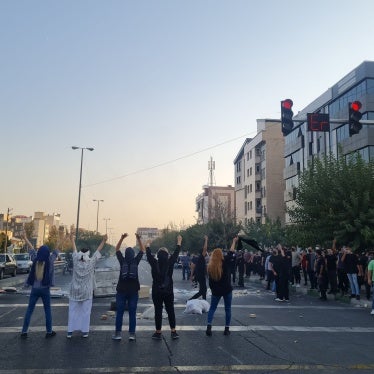The Tunisia most outsiders see is a small, peaceful, modernizing country with beautiful beaches and a GDP well ahead of its non-oil-producing neighbors. It has a well-trained workforce and a moderate Muslim population.
But Tunisian citizens see another side of the country: a repressive state obsessed with maintaining the ruling party's monopoly on power. My Human Rights Watch colleagues and I came up against Tunisia's harsher side last month when we traveled to Tunis, the capital, to release a report critical of the country's authoritarianism.
The report documented government harassment, surveillance and arbitrary measures that severely constrain the daily lives of former political prisoners. Many are required to sign in weekly or even daily at police stations, are denied passports and are confined to their hometowns -- one was banished to a village he'd never lived in.
These measures continue despite years of appeals and court verdicts in the former prisoners' favor. In some cases, the government reportedly has even blocked them from finding jobs, warning potential employers against hiring them.
We didn't expect serious obstacles when we planned our Tunisia trip. In both 2004 and 2005, we released reports at news conferences in Tunis no less critical than the new one, and our events were held without incident. But this time was different.
Soon after our arrival, the communications minister told us that a "sovereign decision" had been made that we not proceed. In subsequent meetings to try to work things out, senior justice and interior officials received us cordially but complained that our report failed to include their viewpoint. They acknowledged that the government hadn't responded to our request for government input nine months earlier. But now they urged us to postpone the report until they could reply.
Soon after that meeting, the hotel where we had booked a conference room for our event informed us with regret that the space was "no longer available." Three more hotels also couldn't accommodate us. We found ourselves under surveillance by at least six plainclothes security agents at all times, and were followed by two cars and a motorcycle, day and night.
The evening before our news conference, we checked into a suite at a large hotel where we hoped to hold our event. But when we returned from dinner that night, we discovered that the suite had been mysteriously flooded by a burst pipe. The hotel regretted to inform us that it had no other rooms available.
I described the flood to a workman at a local cafe. "You won't believe what happened," I remarked. "You don't believe this," he responded, after hearing the story. "You're not Tunisian. Here in Tunisia, we believe everything; we've seen it all." "But the hotel room is ruined," I said. "They've ruined our entire country," he replied. "What's a hotel room?"
We ultimately held our event at the law offices of a prominent human rights lawyer, but not a single journalist showed up. Security agents physically restrained some who tried to attend; others received calls warning them that our gathering was an "illegal" event. The street outside the offices was crawling with plainclothes security men busily recording license plate numbers of cars parked on the street.
In the Middle East, where critical voices often face criminal sanction, simply having such a public event serves a purpose, carving out and protecting a tiny space for free speech. Often we can say things locals can't, protected by our status as an international organization.
The reality is that most Arabs are not free to speak their minds. In some of the relatively more open countries, such as Morocco and Egypt, independent newspapers are allowed to express a diversity of opinions. But even then, journalists and editors remain subject to prosecution for criticizing the government or Islam, and the courts uphold frivolous lawsuits by government officials to stifle investigative journalism. Arab states have responded to the recent explosion of news, information and opinion on the Internet and satellite news by extending their repressive speech laws to include these new media.
Tunisia is among the region's most restrictive countries in terms of the criticism that its citizens may express publicly. The government recently ousted Mohamed Bouebdelli, founder and director of a private university, from the institution he and his family have devoted their lives to, ostensibly over minor infractions found during an inspection but more likely in reprisal for a book he published in France criticizing repression and high-level corruption in his country.
If nothing more, this should give pause to Western governments that have praised Tunisia for its cooperation in "counter-terrorism" and provided aid accordingly. Many of the country's security resources appear devoted not to addressing real threats to security but instead to shielding President Zine el Abidine ben Ali and his government from criticism.
In our case, though, the government failed. Yes, the news conference was disrupted, but the report is widely available online (though blocked in Tunisia), and the government's antics generated far more news than our report alone would have.
But we are concerned about what Tunisia's desire to suppress our report says about the direction the country is heading. There is less space for critical discussion in Tunisia than even a few years ago, cut down by even "modern," progressive-seeming government officials, for whom public service has apparently been confused with "sovereign service."
Sarah Leah Whitson is Middle East and North Africa director at Human Rights Watch.








